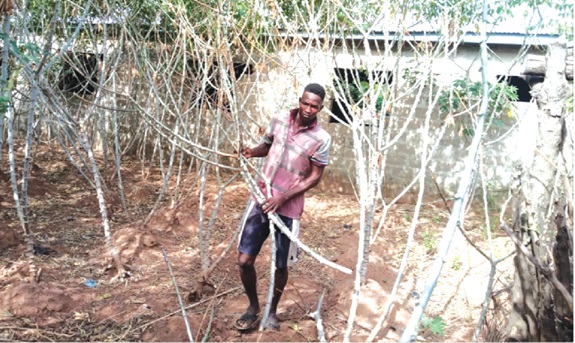
Backyard gardening in Northern Region - Practice worth emulating to drive nutrition, food security
It is 1600 hours at Sorugu, a suburb of Sagnarigu in the Northern Region. Alhassan Mutaru, a 34-year-old farmer, has just dashed into his backyard garden to harvest some cassava and yam for his wife to prepare dinner for the family.
The family’s menu for dinner for the day is fufu with light soup and chicken.
For the past five years, he has been relying largely on the harvest to feed his family.
He has been cultivating yam, cassava, potatoes and vegetables as well as rearing some birds such as guinea fowls on the small piece of fenced land attached to his house.
What he is practicing is basically referred to as mixed farming.
Although, he has cultivated about 10 acres of maize and soyabeans in the farm, that is mainly for commercial purpose.
Mr Mutaru said he was advised by an agricultural extension officer to consider backyard garden, in addition to his farming activities few years ago, and that ever since he decided to give it a try his life has never been the same.
“It is very easy and convenient to access whenever the family needs foodstuffs.
I cultivate everything needed to prepare a meal in the garden by the house, so we no longer buy foodstuffs.”
“Aside from that, everything is organic because I don’t apply chemical insecticides and pesticides on the crops.
I use organic manure such as the animal droppings, which is very healthy” he narrated in an interview with the Daily Graphic.
Just like Mr Mutaru, Mariam Alhassan, a 52-year-old teacher in the Tamale Metropolis, is also making most from her backyard garden.
She said although she was not a full-time farmer, foodstuffs for the family have never been an issue to her because of the garden.
She added: “I plant cassava, plantain, yam, vegetables and also rear some fowls and it has been very helpful.
I do it all year round and this is keeping me going.”
![]()
A backyard garden
Mr Mutaru and Ms Alhassan are part of a few people in the region and beyond who are engaging in backyard gardening as a supplementary source of livelihood or income for the upkeep of their families.
Backyard gardening
Backyard gardening is the practice of turning a space by the home or residential building into a small productive farm for the cultivation of crops, vegetable and rearing livestock and birds to augment food security for households.
It is an important supplemental source, contributing to food and nutritional security and livelihoods for households in peri-urban and urban areas.
In spite of the numerous benefits home gardening provides in ensuring food security, this important life skill which used to be practiced by almost every household in the country is quite uncommon in recent times.
In recent times, back yard gardening is virtually not visible in most homes because they have been cleared to provide accommodation for the ever-increasing urban population demand.
Source of livelihood
Food is life and backyard gardening can help to provide food for underprivileged and resource-poor households, as they can be established and maintained on a small patch of land or with no land using a few inputs.
In an interview with the Daily Graphic, the Management Information System Officer at the Yendi Municipal Department of Food and Agriculture, Issahaku Yabdow, said backyard gardening helped to provide supplementary source of livelihood to households and enhanced food security.
Aside from that, he said it was a form of exercise for persons anytime they worked in the garden, which would go a long way to improve their health.
He said the phenomena of people turning backyard gardens into residential buildings posed a serious threat to the country’s food security, especially in urban areas which have experienced rapid population growth within the last decades.
Mr Yabdow advised farmers to plant improved varieties to increase their yields, advocating awareness creation to whip up public interest in backyard gardening.
Imports, growing population
According to the International Trade Administration (ITA), Ghana remains a major importer of food products, with imports of agriculture related products estimated to have reached $2.6 billion in 2022.
Food and agriculture imports are expected to continue to grow as Ghana’s underdeveloped food processing sector is unable to meet increasing demand.
As the world’s population is expected to increase by nearly 2 billion persons in the next 30 years, from the current 8 billion to 9.7 billion in 2050, there is the need for the nation to continue with diverse efforts that would help increase food production and buffer stocks.
There is the need for the government to initiate deliberate interventions to whip up people’s interest to adopt home gardening, while collaborating with organisations which are already showing the way to scale up the intervention.
As households like that of Alhassan Mutaru and Mariam Alhassan have already shown the way, there is the need for all households and families to emulate and adopt the practice for nutrition and food security.
Writer’s email:
